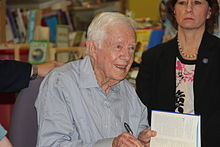By Eric George Tauber

CINCINNATI, Ohio — When I read the news that former President Jimmy Carter had gone into hospice, I began reflecting on his life and career. While I greatly admire his post-executive humanitarian work, Carter’s relationship with Israel and the American Jewish community is a bit more complicated.
Hungry for Honesty
In 1974, the Nixon administration came crashing down under the weight of its scandals. The Pentagon Papers proved that the State and Defense Departments had been brazenly lying about the situation in Vietnam for years. The Watergate scandal further showed that Nixon had an insatiable appetite for power. As a direct result of these scandals coming to light, Nixon resigned in disgrace and his replacement, Gerald Ford, though more sober in demeanor, was seen by many as no great improvement.
Then came a soft-spoken Sunday School teacher from Georgia who promised, “I’ll never tell a lie. I’ll never make a misleading statement. I’ll never betray the confidence that any of you had in me, and I’ll never avoid a controversial issue.” These were sentiments the American electorate were hungry for. Thus, in 1976, Jimmy Carter was elected the 39th president of the United States.
Camp David Accords.
In September of 1978, Pres. Carter met with Egyptian President Anwar el-Sadat and Israeli Prime Minister Menachem Begin at Camp David to negotiate the Camp David Accords. Israel agreed to return the Sinai Peninsula, taken in the War of 1967, in exchange for unfettered passage of Israeli ships through the Suez Canal. In this “land for peace” deal, both countries received billions of dollars worth of U.S. military aid.
Did Israel receive the short end of the olive branch? It’s debatable. The aid was not evenly split. Egypt received 1.3 billion whereas Israel received $3 billion. However, many Zionists saw the relinquishing of the Sinai as a betrayal. Then again, Egypt’s unilateral peace deal got it kicked out of the Arab League. Moreover, Egyptian militants felt so betrayed that in 1981, el-Sadat was publicly assassinated during a parade. It is worth noting that there hasn’t been a war between Israel and Egypt since those accords were signed. On the other hand, it has been a tense peace at best.
The Iran Hostage Crisis
In 1979, the Imperial State of Iran, run by Shah Pahlavi, was replaced by the Islamic State of Iran led by Ayatollah Khomeini, replacing one brutal dictator with another. The Shah fled the country to live in exile in Mexico. When the U.S. allowed the Shah into our country for cancer treatments, some Iranians were outraged. Although his cancer treatments were unsuccessful, on Nov 4, 1979, a militant student group seized control of the U.S. embassy in Tehran, taking 66 hostages.
Diplomatic efforts bore no fruit and the one military attempt at a rescue was a disaster. A helicopter crashed into a transport plane resulting in the deaths of eight U.S. service members and zero hostages freed. Iran later released 14 hostages, but 52 would remain in Iranian custody for 14 months, making the Carter administration appear incompetent and weak. Many Americans concluded that Carter was simply not up to the job and Carter was made a one-term POTUS after Ronald Reagan’s landslide victory in 1980. Adding insult to injury, Iran freed the remaining hostages minutes after Reagan’s inauguration speech.
Humanitarian Work
After his presidency, Carter could have simply retired, but he didn’t. A man of deep faith, Jimmy Carter believed in helping others wherever and however he could. Donning a hard hat and tool belt, Carter volunteered for Habitat for Humanity, building and rehabbing homes for those in need.
Additionally, the Carter Center has been promoting human rights around the globe for forty years, monitoring elections throughout Africa, Asia, and Central America. One public health campaign has greatly improved access to safe drinking water in Africa, reducing cases of Guinea Worm Disease from 3.5 million in 1986 down to just 14 cases in 2021. Carter reportedly said that he wanted to outlive the last Guinea worm parasite.

A Controversial Book
A respected diplomat, the former president was sent to troubled lands like Yugoslavia and the Middle East to help resolve conflicts. He again ruffled Zionist feathers with his book, Palestine: Peace Not Apartheid. Reactions were visceral, judging the book by its title. Calling the nation “Palestine” was seen as erasing Israel. And “Apartheid” evokes images of gross inequality, injustice and brutality along racial lines.
In the book, Carter calls Israel “a wonderful democracy.” Carter further asserted that “apartheid in Palestine is not based on racism, but the desire of a minority of Israelis for Palestinian land and the resulting suppression of protests that involve violence.” He described this as “contrary to the tenets of the Jewish faith and the basic principles of the nation of Israel.” In this statement, he seems to limit his concept of “Palestinian land” to the Gaza and the West Bank. What Carter is not taking into account is that Palestinians tend to regard all of Israel as “Palestinian land.” This sentiment clearly expressed in one of their chants: “From the River to the Sea, Palestine will be free!” The river is Jordan and the Sea is the Mediterranean, leaving no space on the map for a State of Israel.
One particularly problematic sentence asserted that “suicide bombings should end when Israel accepts the goals of the road map to peace with Palestinians….” This implies that Israel had itself to blame for the spate of terrorists who targeted civilians, exploding on buses and in restaurants, bursting with screws and nails soaked in rat poison. It also ignores the relentless propaganda of anti-Jewish hatred that the Palestinian people are immersed in on a daily basis. Carter had the sentence removed from future printings, but he wrote it nonetheless.
Carter accepted many invitations to speak at universities pro bono and take questions about his controversial book. However, when Alan Dershowitz challenged him to a debate at Brandeis, Carter declined. Instead, Carter spoke solo and took questions. Afterwards, Dershowitz took the podium for rebuttal.
Conclusion
In conclusion, I greatly admire Jimmy Carter’s commitment to make the world a better place. Who doesn’t admire a man that, in his golden years, would don a hard hat and strap on a tool belt to build homes for those in need? Furthermore, the work of the Carter Center will outlive its namesake for generations to come, saving and improving the lives of others who have nothing to give in return but their heartfelt thanks. As the Talmud says, saving even one life is like saving the world. Their work to eradicate Guinea Worm Disease alone saves the world many times over.
Then again, all leaders are tested by how they respond to crises. Carter’s greatest trial was the Iran Hostage Crisis, and his mettle was found wanting. As to his take on the Israeli-Palestinian conflict, I wouldn’t call Carter an outright Anti-Semite, though many others did. I think it’s more a matter of perspective. Jimmy Carter never lived in the crosshairs. Unlike many Israelis, no one in Carter’s family had lived through pogroms or had numbers tattooed on their arms. No one publicly celebrates the murder of Baptists in Georgia. Carter had the luxury of looking down on the conflict from his high horse. Had he ever been in those cross-hairs, he might have seen it differently.
*
Now residing in Cincinnati, Eric George Tauber was a San Diego based freelance writer specializing in coverage of the arts. He may be contacted via eric.tauber@sdjewishworld.com
Carter was a disaster for the US.